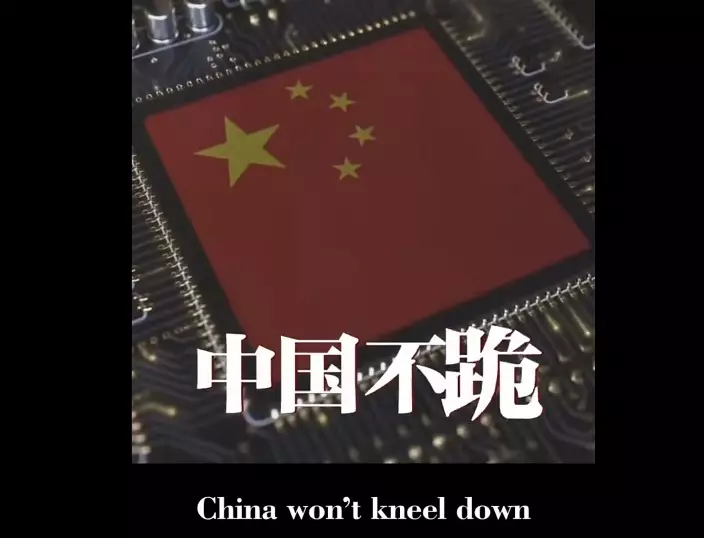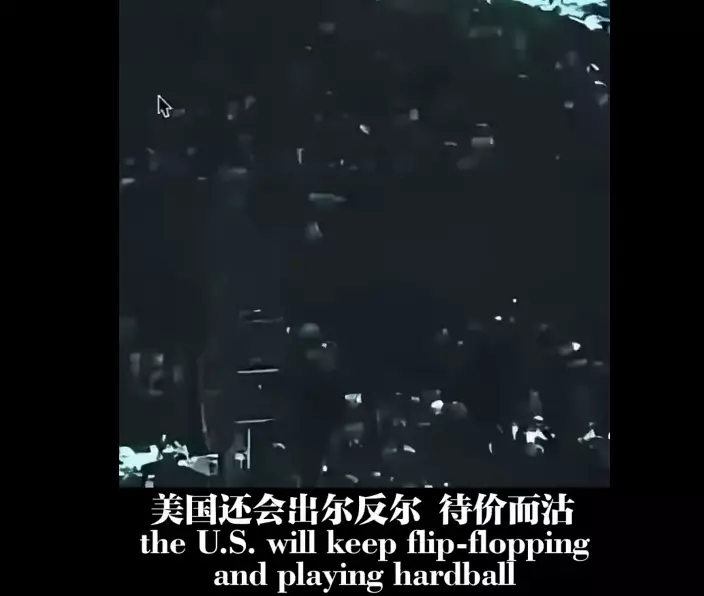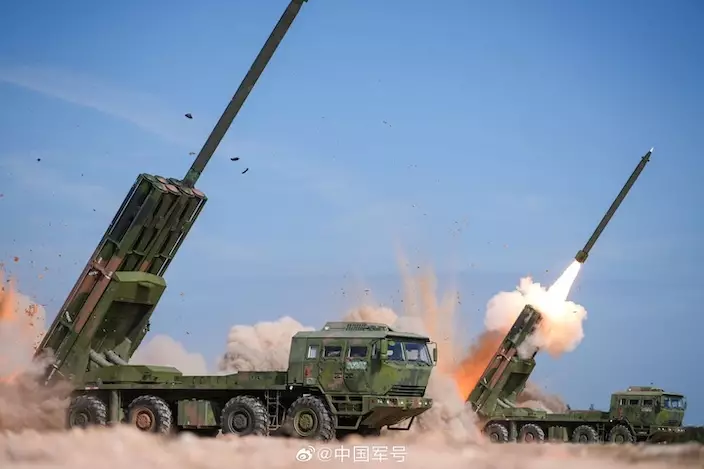On April 29, amid the ongoing China-US trade war, China’s Ministry of Foreign Affairs (MFA) published a high-profile bilingual video titled “China Won't Kneel Down!” on its official WeChat account. The video sharply criticizes the United States for launching a global tariff storm, sidelining China, and coercing other countries to restrict economic and trade cooperation with China. The video likens this to the eye of a typhoon where murderous threat is hidden-“Bowing to a bully is like drinking poison to quench thirst. It only deepens the crisis”- and firmly declares, “China will never kneel!” History, the video argues, has proven that “compromise won’t earn you mercy. Kneeling only invites more bullying.”

Screenshot from the MFA video
The video opens with a rhetorical question:
Click to Gallery
Screenshot from the MFA video
Screenshot from the MFA video
Screenshot from the MFA video
Screenshot from the MFA video
“Have you heard of the eye of the storm? It appears calm for a moment, but is actually a deadly trap. The calm before an even fiercer storm. The US has stirred up a global tariff storm and deliberately targeted China, playing a ‘90-day pause’ game with other nations, forcing them to limit trade with China. This is just like the deadly trap of the eye of the storm. Bowing to a bully is like drinking poison to quench thirst. It only deepens the crisis.”

Screenshot from the MFA video
The video then details past US acts of “hegemonic behavior,” stating:
“The US once accused Japan of dumping semiconductors and crushed companies like Toshiba. Later, it forced Japan to sign the Plaza Accord, pushing the economy into decades of anemic growth. The US also used long-arm jurisdiction as a weapon, breaking up France’s industrial giant Alstom, robbing the country of a national champion. History has proven compromise won’t earn you mercy. Kneeling only invites more bullying.”
The MFA underscores:
“China won’t kneel down. Because we know, standing up for ourselves keeps the possibility of cooperation alive. While compromise snuffs it out, China won’t back down. So the voices of the weak will be heard, bullying will be stopped, and justice will not disappear from the world.”

Screenshot from the MFA video
The video continues:
“All bullies are just paper tigers. The US does not represent the entire world. Its trade makes up less than a fifth of the world’s total. When the rest of the world stands together in solidarity, the US is just a small, stranded boat. Imperialists are always arrogant. If they show a bit of reason, it’s only because they’re forced to do so. Make no mistake, the US will keep flip-flopping and playing hardball. But China will stand firm, no matter how hard the wind blows, no matter how clouds rage. The darker the night, the brighter the stars shine. Someone has to step forward, torch in hand, to shatter the fog and illuminate the path ahead. When every nation stands tall, the world will break through the walls of hegemony. For China, for the world, we must rise and fight on.”

Screenshot from the MFA video
Meanwhile, Wang Yi, Member of the Political Bureau of the CPC Central Committee and Minister of Foreign Affairs, reiterated China’s position at the BRICS Foreign Ministers’ Meeting in Rio de Janeiro, Brazil. He stated that the US is using tariffs as bargaining chips to extort exorbitant demands from other countries. If the international community chooses silence, compromise, or retreat, it will only embolden the bully. Wang stressed that BRICS nations should jointly oppose all forms of protectionism.
Wang Yi emphasized that multilateralism is the cornerstone of the post-WWII international order, and solidarity and cooperation are the greatest common denominators of the international community. However, some countries have developed a seriously distorted understanding of the world; the US pursues unilateralism and “America First,” placing its own interests above the global public good. While the current international system underpins global stability and prosperity, the US -- as its biggest beneficiary -- is now undermining it.
Wang further stated that “the law of the jungle” is making a comeback, with coercion and bullying no longer disguised, and the foundations of international relations under continuous threat. He stressed that defending multilateral trade rules is now the most urgent task. Trade, by nature, is about complementary strengths and mutual benefit, not a tool for selfish gain. BRICS countries, he said, should resolutely oppose all forms of protectionism, uphold a rules-based multilateral trading system with the WTO at its core, maintain its core values and basic principles, and promote trade liberalization and facilitation.
Mao Paishou
** The blog article is the sole responsibility of the author and does not represent the position of our company. **
The New Year barely begins, and Washington drops a flashbang on global diplomacy. A sitting president is forcibly detained and taken out of his own country — a move that blows past diplomatic convention and rams straight into international law’s red lines. On Taiwan, the chatter instantly turns into self-projection, as some people try to shoehorn a faraway conflict into the island’s own storyline. Anxiety spreads fast.

Maduro in cuffs, in a US federal courtroom — the raid’s image problem. (AP)
The South China Morning Post says the US action against Venezuela ignites a fierce debate on the island. Some commentary links the raid to the PLA’s recent encirclement drills around Taiwan, arguing parts of those exercises look, at least in form, like the US’s so-called “decapitation operations”: essentially a leadership-targeting operation. Some American scholars also warn this kind of play could set a dangerous precedent and invite copycats.

“Justice Mission-2025” rolls on as the Eastern Theater Command drills.
That debate doesn’t stay academic for long. It pumps up the island’s unease, with some people asking whether the same kind of military method could one day be copied and pasted into the Taiwan Strait. Even if it mostly lives in public talk, a high-tension political environment turns speculation into something that feels like risk.
People on the island don’t read the US move the same way. A small minority treats it as a US power flex, packed with intel integration, precision strike, and long-range reach. But the more clear-eyed view is harsher: such action chips away at the basic consensus of international order — because if major powers can raid at will and topple other countries’ leaders for their own aims, “rules” stop acting like rules.
Anxiety turns into politics
That worry quickly lands in Taiwan’s political arena. On Jan 5, multiple Taiwan legislators pressed Deputy Defense Minister Hsu Szu-chien at the legislature, asking how he views the US action against Venezuela and whether the PLA might replicate a similar model in the Taiwan Strait. Hsu doesn’t answer head-on. Rather, he merely mentioned preparing and drilling for all kinds of sudden contingencies.
Then he pivots to money. He urges the legislature to pass military budget appropriations quickly and plays up the urgency of delays eating into “preparation time.”
That kind of sidestep, unsurprisingly, only deepened public unease.
SCMP, citing multiple security experts, says the DPP authorities try to play down the association — but outsiders don’t fully rule it out. The reason, those experts argue, is the PLA’s continuing push to improve its ability to shift from exercises to real combat. On the island, that alone works like an anxiety amplifier.
Back in the real world, the PLA Eastern Theater Command has been running “Justice Mission-2025” exercises since Dec 29 last year. Official statements spell out the purpose: a stern warning to “Taiwan independence” separatist forces and external interference, and a move aimed at safeguarding national sovereignty and unification. The message is public and clear, there’s no gray area.
Some US think-tank voices pull a more confrontational takeaway from the US action. American Enterprise Institute senior fellow Hal Brands warns the US raid on Venezuela could create a “demonstration effect,” and he speculates China would watch those tactics closely. Some military commentators on the island seized the moment to hype fears, claiming the mainland might act during a “window” when US power is stretched thin.
That line of talk sounds like analysis, but it functions like a panic pump. US scholar Lev Nachman even says bluntly on social media that if a sudden military action hits the Taiwan Strait, the island could suffer “instant collapse” — not just militarily, but as a psychological shock to society.
KMT Chairperson Cheng Li-wun, in an interview, points to Donald Trump repeatedly stressing a shift of strategic focus toward affairs in the Americas. She says the Venezuela incident should be examined through the framework of international law, and she calls for disputes in any region to be resolved by peaceful means rather than force.
Cheng also reiterates the KMT position: uphold the “1992 Consensus,” oppose “Taiwan independence,” and urge Lai Ching-te to clearly oppose “Taiwan independence,” not touch legal red lines, and avoid continuously raising cross-strait conflict risks.
Rules talk meets reality
International reaction also turns critical of Washington’s approach. Multiple governments and regional organizations speak up quickly, condemning the action as a violation of the UN Charter, which explicitly prohibits using force to threaten or violate another nation’s territorial integrity and political independence. The telling part is the silence: the Western countries that often talk about “international rules” either zipped their mouths, or danced around the question this time.
Reuters says that even though China, Russia, and others clearly condemn the US behavior, the Trump administration is unlikely to face strong pressure from allies as a result. That selective muteness, by itself, drains the credibility of the international order.
On Jan. 5, Chinese Foreign Ministry spokesperson Lin Jian commented again, saying the US actions clearly violate international law and the basic norms of international relations, and violate the purposes and principles of the UN Charter. China calls on the US to ensure the personal safety of President Maduro and his wife, immediately release them, stop subverting the Venezuelan government, and resolve issues through dialogue and negotiation.













